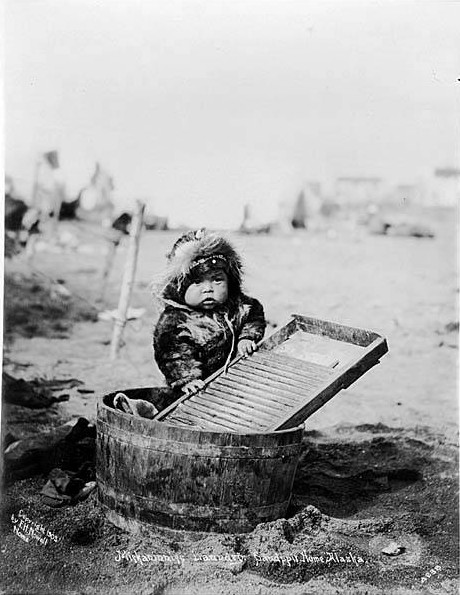\
Does someone really have to do the dirty jobs?
\
Doing the laundry used to be backbreaking toil. Haul the water, chop
the wood, light the fire, heat the water, and now you are ready to
begin the really tough part of the work. The old saying goes “Wash on
Monday”, because Monday is the day after your day of rest, and
otherwise you won’t have the strength to do the washing.
And the saying continues: “Iron on Tuesday, mend on Wednesday”.
Routine management of clothing takes half of the six-day work week.
For this reason, washing is the work of last resort for the poorest
and most marginal people. Widows are washerwomen.
Prisons are laundries.
Chinese immigrants run laundries. Anyone
with enough money to outsource their laundry does so.
The invention of mechanical washing machines eliminated a great amount
of human suffering and toil. Machines do the washing now. Nobody has
to break their back scrubbing soiled linens against a washboard.
“Eskimo child with wooden tub and
washboard”, c. 1905, by Frank
Hamilton Nowell, public domain, via
Wikimedia Commons.
But the flip side of that is that there are still poor and
marginalized people, who now have to find other work. Mechanical
laundry has taken away their jobs. They no longer have to do the
backbreaking labor of hand laundry. Now they have the option to
starve to death instead.
Is it a net win? I don’t know. I’d like to think so. I’d like to
free people from the toil of hand laundry without also starving some
of them to death. Our present system doesn’t seem to be very good at
that sort of thing. I’m not sure what a better system would look
like.
Anyway, this is on my mind a lot lately because of the recent
developments in computer-generated art. I think “well, it’s not all
bad, because at least now nobody will have to make a living drawing
pornographic pictures of other people’s furry OCs. Surely that is a
slight elevation of the human condition.” On the other hand, some of
those people would rather have the money and who am I to deny them
that choice?
\
*[Other articles in category /misc]
permanent link*
\
Does someone really have to do the dirty jobs?
Haul the water, chop the wood, light the fire, heat the water, and now you are ready to begin the really tough part of the work.
For this reason, washing is the work of last resort for the poorest and most marginal people.
They no longer have to do the backbreaking labor of hand laundry.
I’d like to free people from the toil of hand laundry without also starving some of them to death.
Does someone really have to do the dirty jobs?
Doing the laundry used to be backbreaking toil. Haul the water, chop
the wood, light the fire, heat the water, and now you are ready to
begin the really tough part of the work. The old saying goes “Wash on
Monday”, because Monday is the day after your day of rest, and
otherwise you won’t have the strength to do the washing.
And the saying continues: “Iron on Tuesday, mend on Wednesday”.
Routine management of clothing takes half of the six-day work week.
For this reason, washing is the work of last resort for the poorest
and most marginal people. Widows are washerwomen.
Prisons are laundries.
Chinese immigrants run laundries. Anyone
with enough money to outsource their laundry does so.
The invention of mechanical washing machines eliminated a great amount
of human suffering and toil. Machines do the washing now. Nobody has
to break their back scrubbing soiled linens against a washboard.
 “Eskimo child with wooden tub and
“Eskimo child with wooden tub and
washboard”, c. 1905, by Frank
Hamilton Nowell, public domain, via
Wikimedia Commons.
But the flip side of that is that there are still poor and
marginalized people, who now have to find other work. Mechanical
laundry has taken away their jobs. They no longer have to do the
backbreaking labor of hand laundry. Now they have the option to
starve to death instead.
Is it a net win? I don’t know. I’d like to think so. I’d like to
free people from the toil of hand laundry without also starving some
of them to death. Our present system doesn’t seem to be very good at
that sort of thing. I’m not sure what a better system would look
like.
Anyway, this is on my mind a lot lately because of the recent
developments in computer-generated art. I think “well, it’s not all
bad, because at least now nobody will have to make a living drawing
pornographic pictures of other people’s furry OCs. Surely that is a
slight elevation of the human condition.” On the other hand, some of
those people would rather have the money and who am I to deny them
that choice?


